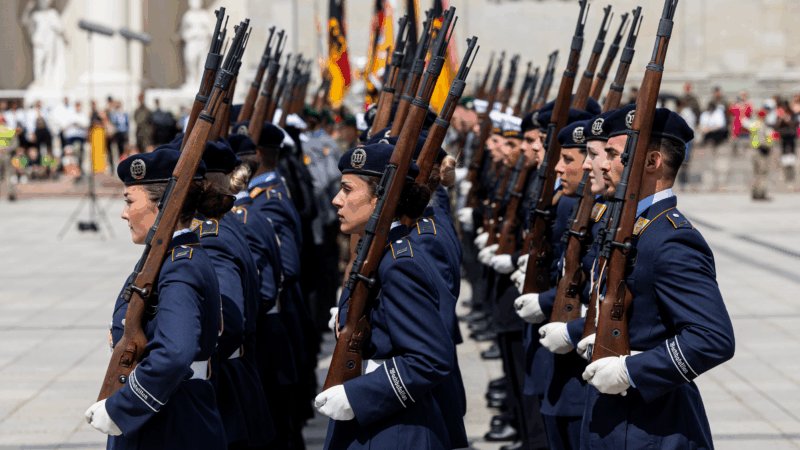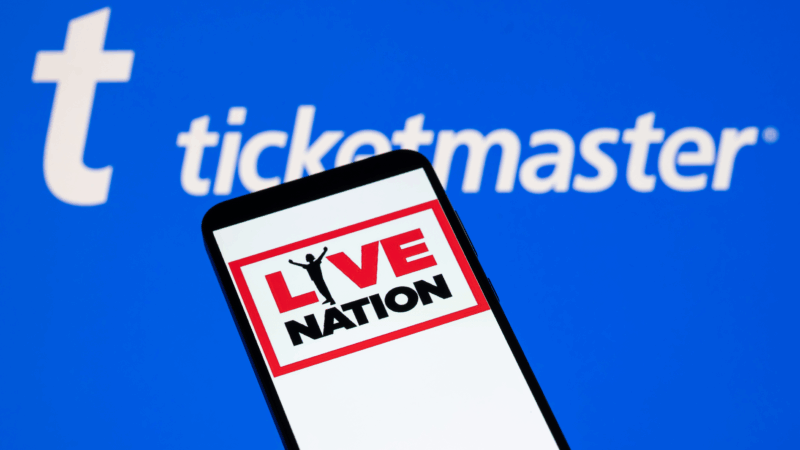In an about-face, Germany plans to build Europe’s biggest military
BERLIN — Six weeks into his current term in office, President Trump was asked by a reporter about countries, like Germany, that for decades had not spent 2% of their GDPs on defense — despite, like all NATO countries, having made that commitment.
His response was chilling to many in Europe.
“Well, I think it’s common sense, right?” Trump said, interrupting the reporter asking the question. “If they don’t pay, I’m not going to defend them.”
A new Trump presidency and a war on European soil have pushed Germany — a country that for the better part of the past two decades has spent between 1% and 2% of its gross domestic product on its beleaguered military — to take the big step of changing its constitution to free up the money to spend more.
Two months after Trump’s comments, incoming German Chancellor Friedrich Merz gave what many observers saw as a historic speech to parliament.
“Building up our military is our top priority,” said Merz. “From now on, the federal government will provide the military with as much money as it needs to ensure it becomes Europe’s strongest armed force. We are Europe’s most populous country and Europe’s biggest economy, and nothing less should be expected from us. Our partners not only expect this — they demand it.”
Changing the national DNA
“So this sense of urgency made a decision possible that was unthinkable before,” says Claudia Major, senior vice president overseeing trans-Atlantic security initiatives at the German Marshall Fund.
She says the German government’s plan over the next decade to spend 3.5% of its GDP on defense — a percentage equal to that of the United States — is a bold and surprising move.
“But we also know that the DNA of a country — the way our country and the citizens behave in defense, how they see military force, how they see their armed forces — takes years and decades to change,” she says. “Normally we say it takes a generation.”
Germany won’t cut social programs for defense. A $117 billion special fund and a 2025 constitutional change suspending what’s known in Germany as the debt brake — or balanced budget spending cap — let it borrow separately from the normal federal budget for defense and infrastructure. This will enable close to $400 billion in defense spending through 2029 without affecting core budgets — for now.
Some parts of German society, especially businesses in the defense sector, are more ready than others for this historic change.
In an industrial park outside Munich, a worker completes a series of tests on a drone that has just come off the assembly line at Quantum Systems. The aircraft, called the Vector, is the company’s bestselling drone, says Director of Operations Alexandra Rietenbach. “It’s our dual-use product,” she says. “It’s used on the one hand in Ukraine. It’s also used for the German armed forces. It also is used in Europe in general, in different organizations like police, like border control.”

Rietenbach says Ukrainian troops rely on the Vector and the company’s other drones to gain a military advantage against invading Russian troops. As a result, Quantum Systems’ chief sales officer, Martin Karkour, says sales have picked up. “We are doubling each year in terms of sales and revenue, and also in terms of head count,” he says.
Buying weapons is the easy part
While business for defense companies like Quantum Systems looks promising, Germany’s defense spending boost might take some time when it comes to rebuilding a culture of military service.
At a job fair in Berlin, the Bundeswehr, Germany’s armed forces, has set up a recruiting booth staffed by Marco Mann, who has recruited at fairs like this for 18 years. He says the German public’s attitude toward its armed forces is improving.
“I never used to hear ‘Thank you for your service’ from others, but that’s starting to change,” he observes. “People now are thanking us for our support of Ukraine, thanking us for being here — it’s a nice change.”
Germany is the third-biggest provider of military support to Ukraine, after the U.S. and the United Kingdom. It provides weapons systems prized by Ukraine, including Leopard 2 tanks, the IRIS-T air defense systems, ammunition and artillery shells. Germany has also welcomed 1.2 million Ukrainian refugees, according to the German Interior Ministry.
Abdul Rehman Saeed is one of the job seekers at this fair. He’s 32, was born in Pakistan, has lived in Germany for a decade and is a German citizen. He says he’s interested in joining the Bundeswehr as an IT specialist. “I think it’s not about going to the battlefield, but as a preemptive measure to actually help them if they are trying to do something and might need someone with a cybersecurity background, because everything is now cyberwar,” he says.
He says Germany has given him a free education, affordable health care and many other opportunities. “I feel personally responsible to provide back to this society because Germany gave me a life I wanted,” he says.
In return, he says, if he gets job security, then joining the Bundeswehr is a “win-win.” And as the Bundeswehr has more money and begins the challenging process of recruiting more personnel, it hopes to gain prestige, both domestically and internationally.
Esme Nicholson contributed to reporting from Berlin.
Transcript:
ARI SHAPIRO, HOST:
Germany has a complicated relationship with its military. Two world wars when the country was on the wrong side of history have taught Germans to be cautious about the pitfalls of a big army. But with a war on European soil and a U.S. president who is less committed to defending Europe, Germany – Europe’s largest economy – is stepping up. NPR’s Berlin correspondent Rob Schmitz reports.
ROB SCHMITZ, BYLINE: Just six weeks into his current term in office, President Trump was asked a question about countries like Germany, which for years have not paid 2% of their GDP on defending themselves a requirement of all NATO countries. He was so eager to answer that he interrupted the reporter.
(SOUNDBITE OF ARCHIVED RECORDING)
PRESIDENT DONALD TRUMP: Well, think it’s common sense, right? If they don’t pay, I’m not going to defend them.
SCHMITZ: A new Trump presidency and an ongoing war on European soil has pushed Germany – a country that for the better part of two decades spent around a single percent of its GDP on its beleaguered military – to finally change its constitution in order to spend more. Just weeks after Trump’s comments, incoming German Chancellor Friedrich Merz gave what many observers saw as an historic speech to Parliament.
(SOUNDBITE OF ARCHIVED RECORDING)
CHANCELLOR FRIEDRICH MERZ: (Speaking German).
SCHMITZ: “Building up our military,” said Merz, “is our top priority. From now on, the federal government will provide the military with as much money as it needs to ensure it becomes Europe’s strongest armed force. We are Europe’s most populous country and Europe’s biggest economy, and nothing less should be expected from us. Our partners,” said Merz, “not only expect this, they demand it.”
CLAUDIA MAJOR: So this sense of urgency made a decision possible that was unthinkable before.
SCHMITZ: Claudia Major is a political scientist at the Berlin office of the German Marshall Fund. She says the German government’s plan to, over the next decade, spend 3.5% of its GDP on defense – a percentage equal to that of the United States – is a bold move.
MAJOR: But we also know that the DNA of a country, the way how a country, the citizens behave in defense, how they see military force, how they see their armed forces, takes years and decades to change. Normally, we say it takes a generation.
SCHMITZ: But some parts of German society are more ready than others for this historic change. Inside an assembly room in an industrial park outside Munich, a worker tests a drone.
(SOUNDBITE OF MACHINERY HUMMING)
SCHMITZ: It’s called a Vector, and for Quantum Systems, it’s their best-selling drone, says Director of Operations Alexandra Rietenbach.
ALEXANDRA RIETENBACH: It’s our dual-use product. It’s used, on the one hand, in Ukraine. It’s also used for the German armed forces. It also is used in Europe in general, in different organizations like police, like border control.
SCHMITZ: The Vector has rotating propellers that enable it to go up and down like a helicopter and then shift into what’s called glide mode, like a plane.
RIETENBACH: So if you go into the gliding mode, you have much more capability to fly longer distances, to use the circumstances in the air for saving energy.
SCHMITZ: Rietenbach says Ukrainian troops rely on the Vector and the company’s other drones to gain a military advantage against invading Russian troops. As a result, she says, sales have picked up from selling 200 vectors in 2023.
RIETENBACH: Last year, we more than tripled. So for this year, we have also the aim to sell around about 1,500 to 2,000 Vectors. So sales is running smoothly.
SCHMITZ: And while business for German defense companies like Quantum Systems look promising, the country’s defense spending boost might take some time when it comes to rebuilding a culture of military service. That starts here at a job fair in Berlin, where the Bundeswehr, Germany’s armed forces, has set up a recruiting booth.
MARCO MANN: (Speaking German). Thank you for service. (Speaking German).
SCHMITZ: Recruitment officer Marco Mann says, In his 18 years of recruiting at fairs like this one, he never used to hear, thank you for your service, but that’s starting to change, he says. People are thanking us for our support of Ukraine, thanking us for being here. It’s a nice change, he says. Abdul Rehman Saeed is one of those gracious job-seekers at this fair. He’s 32, born in Pakistan, but has lived in Germany for a decade and is a German citizen. He’s interested in joining the Bundeswehr as an IT specialist.
ABDUL REHMAN SAEED: It’s not about going to the battlefield, but as a preemptive measure to actually help them if they are trying to do something, and might be they need someone with the cybersecurity because everything is now cyber war.
SCHMITZ: Rehman Saeed says Germany has given him a free education, affordable health care, opportunities.
REHMAN SAEED: I feel personally responsible to provide back to the society because Germany gave me a life I wanted.
SCHMITZ: And in return, he says, if he gets job security, then joining the Bundeswehr is a win-win. And as the Bundeswehr has more money and begins the challenging process of recruiting more personnel, it hopes to gain prestige, both domestically as well as internationally – a return to the days when Germany helped maintain security for itself and for Europe. Rob Schmitz, NPR News, Berlin.
This quiet epic is the top-grossing Japanese live action film of all time
The Oscar-nominated Kokuho tells a compelling story about friendship, the weight of history and the torturous road to becoming a star in Japan's Kabuki theater.
The Live Nation trial could reshape the music industry. Here’s what you need to know
On Tuesday opening statements will begin for the federal antitrust trial against Live Nation, one of the largest entertainment companies in the world.
A new one-a-day-pill holds promise for HIV’s ‘forgotten population’
It's designed to take the place of complicated, multiple drug regimens that many people with HIV need to follow. And it's also beneficial because the HIV virus is always evolving.
For filmmaker Chloé Zhao, creative life was never linear
Director Chloé Zhao used meditation, somatic exercises and dance to inspire the cast and crew of this Oscar-nominated story about William Shakespeare's family.
10 new books in March offer mental vacations
March is always a big one for books – this year is no different. We call out a handful of upcoming titles for readers to put on their radars — offering a good alternative to doomscrolling.
Sen. Chris Coons, D-Del., talks about the war with Iran and upcoming war powers vote
NPR's A Martínez asks Delaware Democrat Chris Coons, a member of the Senate Foreign Affairs Committee, about the war with Iran.







